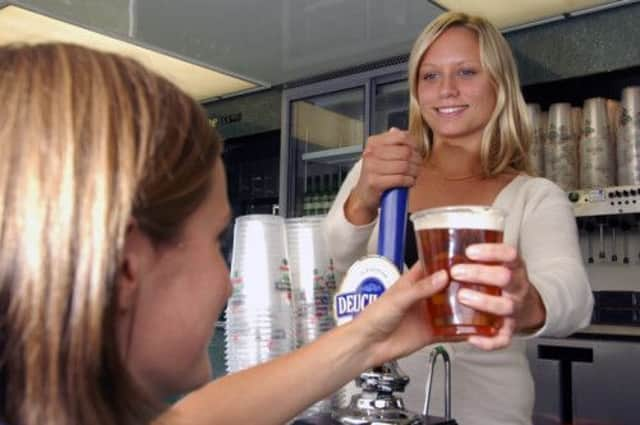Scots still drink more than the English


A new report from NHS Health Scotland also found two-thirds of alcohol sold in 2012 was below the proposed minimum price of 50p per unit.
In 2012, 10.9 litres of pure alcohol was sold per adult in Scotland, compared to 9.2l south of the Border.
Advertisement
Hide AdAdvertisement
Hide AdThe Scottish figure is the equivalent of 21 units per adult per week – the maximum level for men and above the recommended amount for women.
While beer, wine and cider sales are similar to England and Wales, Scots drink far more spirits – almost three litres per adult per year, compared to less than two litres in England and Wales.
Vodka is Scotland’s favourite short, followed by whisky. Scots drink twice as much vodka, rum and gin, and 30 per cent more whisky, than the English and Welsh.
Despite this, drinking levels are falling across the UK. In Scotland, alcohol sales fell by 3 per cent between 2011 and 2012, and by 8 per cent since 2009, when levels started to decrease after more than a decade on the rise.
The consumption gap between Scotland and England and Wales has also narrowed, but not significantly, and is still far wider than in 1994, when it was 10.2 litres of pure alcohol per adult north of the Border, and nine litres in the south.
The Scottish Government has taken steps to reduce harmful drinking, with measures such as banning multi-buy discounts, and it wants to create a minimum price to eliminate cheap alcohol from the market.
However, health leaders warn more action is needed.
Mark Robinson, public health information manager at NHS Health Scotland, said: “It is good news for Scotland’s health and wellbeing that alcohol consumption is starting to decline.
“We know that the ban on multi-buy promotions was associated with a fall in sales and that alcohol affordability has declined as a result of the challenging economic climate.
Advertisement
Hide AdAdvertisement
Hide Ad“Other policy actions, such as interventions for hazardous and harmful drinkers, are also likely to be having an impact. However, we’re still drinking too much as a nation and a large proportion of alcohol is still being sold at relatively low prices.”
The Scottish Government believes the fact that a quarter of alcohol bought from off-sales in 2012 was below 40p per unit, and two-thirds below 50p, adds weight to its desire to introduce a minimum price.
Public health minister Michael Matheson said: “We still drink around a fifth more than England and Wales. That is fuelling much higher levels of harm, which results in 100 alcohol-related hospital admissions a day and costs Scotland £3.6 billion each year – £900 for every adult in Scotland.”
However, the Scottish Government’s plans have been delayed by a legal challenge from whisky chiefs. Campbell Evans, Scotch Whisky Association government and communications director, said: “Minimum unit pricing is not the way to tackle misuse – it does not target the heaviest drinkers, it would be illegal and it would damage the Scotch whisky industry.”